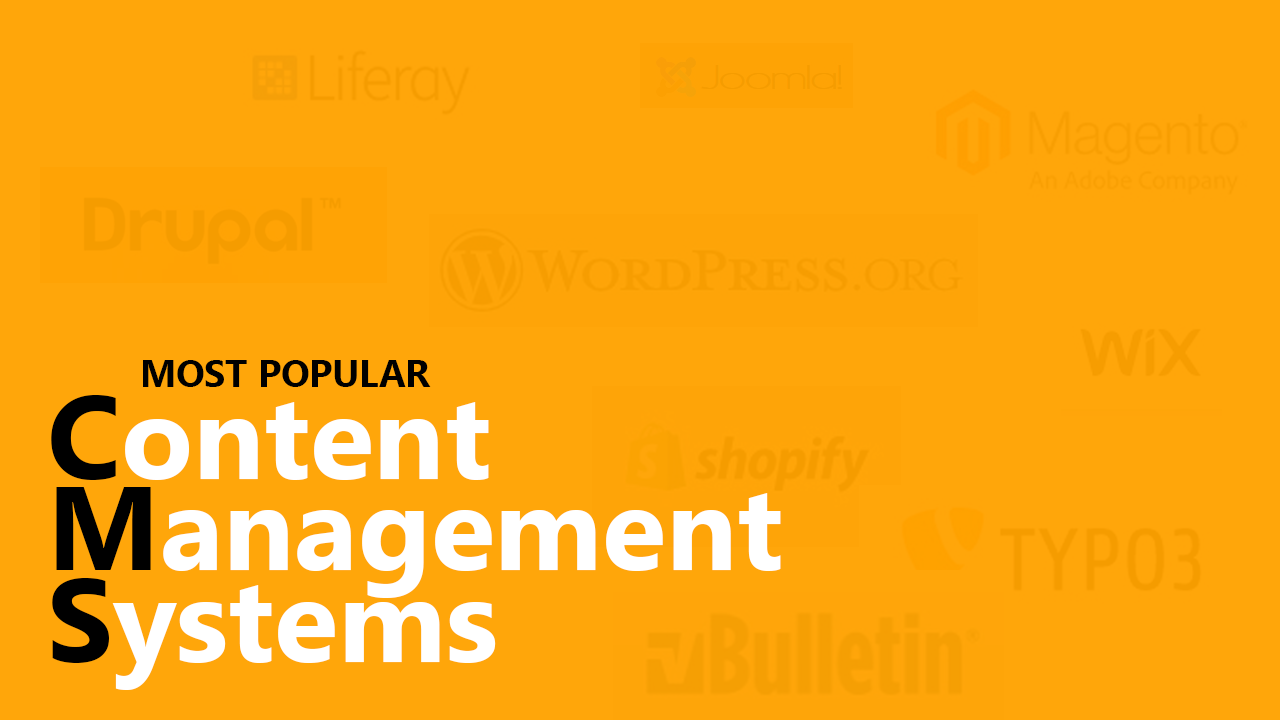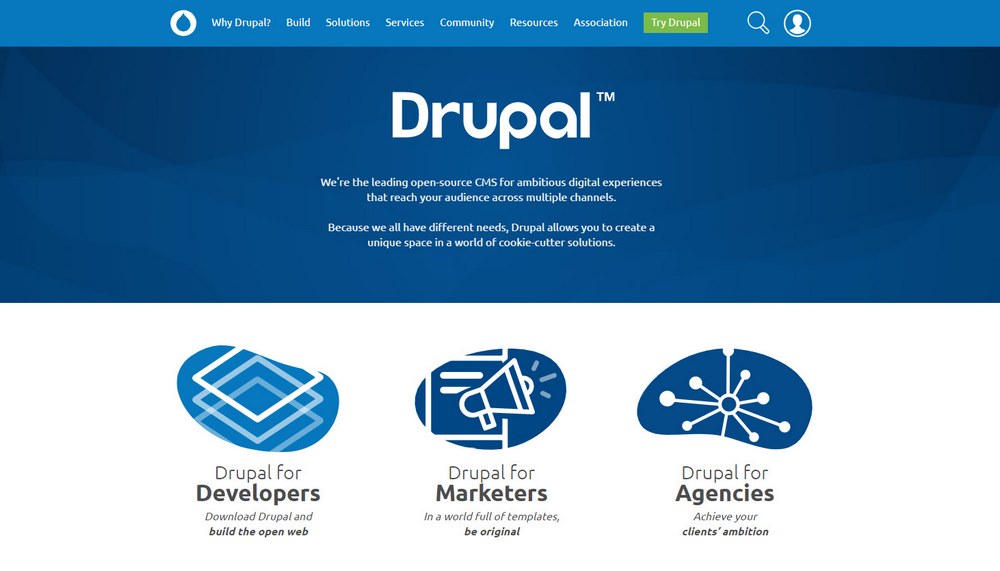Top Most Popular Content Management Systems
October 2, 2019 | Content Management System, All, WordPress | No Comments

When it comes to building a great websites that are focused on content, the best option is usually to go for a content management system(CMS). Having a custom website developed without a big maintenance budget for the future, can have a huge impact on your business operations in the long run. Most of the content management systems today are easily maintainable and open-source.
W3Tech’s Content Systems Management report states that the leading three CMS is responsible for more than 70% of total CMS usage on all websites on the web.
You can learn more about other types of content management systems using this website.
This roundup of leading content management systems focuses on both major platforms, but also a niche in markets such as eCommerce.
Startups, creative artists, eCommerce business owners, writers, and many others who come from other similar fields have realized that you don’t need to invest thousands of dollars into your own personal content management platform, and instead it’s possible to rely on what is already available, fully established and support by community of experts.
The following list of the most popular content management systems is gathered from the data of some of the major analytics platforms on the web, and we have ensured that there is enough diversity so that anyone and everyone can find a solution to their particular idea.
1. WordPress – The Top Content Management System
A well known name in the content management system market, WordPress is the ultimate publishing platform for the web. Sites of all sizes can rely on WordPress to help publish, manage and organize a wide variety of content; Articles, tutorials, photos, videos, stories, and more. WordPress is not only easy to learn but also highly flexible for beginners and experienced users. The public plugin repository has a special 40,000 free plugins you can download from WordPress, while the public WordPress theme database has over 2,100+ styles to choose from.
WordPress has become the standard for a website that is both functional and enjoyable to browse. Startups and mobile applications have long transferred to WordPress for their website needs, not only due to the diverse styles and design flexibility available, but that WordPress is safe, reliable, and enjoyable to work with. WordPress users have the option to create a site of any reference; ECommerce, business, creative, community, non-profit and so forth.
2. Joomla!
Joomla! Is for those looking for a challenge, at least in terms of coding power. In many ways, the developers built Joomla! Considering sites of medium to large size. Joomla! The codebase is a lot more sophisticated than WordPress, but it comes at the benefit of greater scalability and greater back-end integration.
Many people I know who are using Joomla! The native is quite fond of features such as front-end content editing, content management flexibility, and native integration of multiple languages that make sites more friendly to visitors of a foreign nature.
3. Shopify (eCommerce)
Shopify is another eCommerce platform that is more focused on helping freelancers, small businesses. It also helps corporation size businesses that need reliable and secure eCommerce platform services. It has been around for long enough to be respected as one of the leading eCommerce content management platforms. A few million also refer to the home for community members who actively use it to sell, buy and trade products. Shopify works beautifully with any kind of device. This makes it very appealing to those who don’t have a huge budget to shell out on custom designs. In addition, Shopify offers several designs that you can completely customize yourself.
4. Drupal
Drupal goes even or deeper into the tectonics of the content management mode, and how it is widely adoptive due to professional coding standards, with a great developer, engineer, and webmasters using Drupal as their primary content management platform Have adapted. It provides over 30,000 expandable modules to bring your site to a whole new level, plus 2,000+ personal and unique themes that will help create the site you’ve always wanted to create. Thousands of forum members participate in discussions daily, which means that it is not difficult to find support for Drupal, but rather a question of whether you really need or whether there are resources available to visit community forums can solve your problem.
5. Wix
Wix is by far the most popular website builder with millions of users worldwide. It is considered as a CMS but is not a standalone CMS which means that you are bound to their service. It is a great service regardless but keeps in mind that you can’t decide where and how to host it. This makes it much easier to set up and use than most but might become pricing as your business and traffic to your website grows.
6. Magento (eCommerce)
eCommerce is a market in itself, and it’s important that we realize that for some of our eCommerce tasks, perhaps the best choice is to opt for an independent eCommerce platform altogether, and one such platform is Magento. Whether you’re looking for a small business solution in an environment where nobody really understands technology, or you’re working from a corporation that needs a professional enterprise eCommerce solution — There is likely to be an option for Magento that will not disappoint you in any way. Companies. like Nike, Gant, and Cort are just some of the people on the client list of Magento’s eCommerce platform
7. Blogger
Blogger has evolved a lot in the last few years. But, it maintains its legacy towards being a blogging platform. Developers use it as a content management system in more ways than one. In recent years, a lot of flexibility was introduced in how to style Blogger sites. This means that photographers, food, and creatives have more space to create a content platform that suits their needs. Blogger is part of Google and offers a range of features like custom domains, custom styles, and customization options.
8. vBulletin
vBulletin used to be just a forum platform. In recent years, a switch happened from traditional forum community services to a more content management-oriented platform. It also still involves a lot of community involvement through native forum functions. Those wishing to build a community around their content should see vBulletin as one of the top choices. It is secure and the team behind this platform have over a decade of experience with building platforms. It also supports some of the largest communities in the world. It’s the perfect platform for webmasters who want to create a lot of content with the help of the community.
9. TYPO3
The biggest argument about TYPO3 versus other content monograph systems is that TYPO3 is specially designed for sites to serve very large-scale, as well as a native content management platform, while platforms such as WordPress are traditionally Is considered to be a native blogging platform.TYPO3 is popular amongst corporate websites, thanks to its integration of features that would otherwise require extensions or plugins. We all know that these sites slow down and the overall site performance nut TYPO3 has integrated them for you. The developers made the TPO3 highly flexible. You can extend it using the new function without writing any program code.
10. Liferay
Liferay is a fairly new sportsman in the CMS game but is already home to a few 1,500+ customers. These customers enjoy building-specific websites, customer portals, membership sites and content resources for any kind of needs. Liferay’s modern approach to design and technology has enabled them to attract their audiences. Audiences that want to build professional and good looking sites with the help of latest advancements in content technology.









